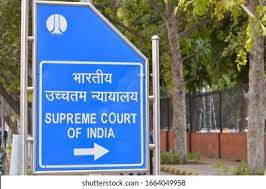The first prayer relates to expeditious disposal of criminal cases against elected members of the Parliament and Legislative Assemblies[Hereinafter referred to as the ‘subject cases’.]. The second prayer relates to the constitutional validity of Section 8 of the Representation of Peoples Act, 1951. (Para 1)
Having considered the matter in detail, we are of the opinion that there exist multiple factors. Each of these influences early disposal of the subject cases. This, coupled with their dissimilarity from State to State, makes it difficult for this Court to form a uniform or standard guideline for trial courts across the length and breadth of this country to dispose of the subject cases. We have gone through the affidavits filed by the High Courts explaining the situation that exists within their jurisdiction. The High Courts have been dealing with these issues on the judicial as well as on the administrative side, and they are alive to the position that exists in each of their district courts. Under Article 227, the High Courts are entrusted with the power of superintendence over the district judiciary[Though Constitution uses the expression ‘subordinate’ to describe the district judiciary, it is not to be understood in the literal sense. In fact, this Court in All India Judges Association v. Union of India & Ors., 2023 SCC OnLine SC 673, has held that district judiciary is a part of our basic structure.]. We deem it appropriate to leave it to the High Courts to evolve such method or apply such measure that they deem expedient for an effective monitoring of the subject cases. (Para 19)
Having considered the matter in detail, we direct that:
(i) Learned Chief Justices of the High Courts shall register a suo-motu case with the title, “In Re: designated courts for MPs/MLAs” to monitor early disposal of criminal cases pending against the members of Parliament and Legislative Assemblies. The suo-motu case may be heard by the Special Bench presided by the Learned Chief Justice or a bench assigned by them.
(ii) The Special Bench hearing the suo-motu case may list the matter at regular intervals as is felt necessary. The High Court may issue such orders and/or directions as are necessary for expeditious and effective disposal of the subject cases. The Special Bench may consider calling upon the Advocate General or the Public Prosecutor to assist the Court.
(iii) The High Court may require the Principal District and Sessions Judge to bear the responsibility of allocating the subject cases to such court or courts as is considered appropriate and effective. The High Court may call upon the Principal District and Sessions Judge to send reports at such intervals as it considers expedient.
(iv) The designated courts shall give priority: (i) first to criminal cases against MP’s & MLA’s punishable with death or life imprisonment then to (ii) cases punishable with imprisonment for 5 years or more, and then hear (iii) other cases. The Trial Courts shall not adjourn the cases except for rare and compelling reasons.
(v) The learned Chief Justices may list cases in which orders of stay of trial have been passed before the Special Bench to ensure that appropriate orders, including vacation of stay orders are passed to ensure commencement and conclusion of trial.
(vi) The Principal District and Sessions Judge shall ensure sufficient infrastructure facility for the designated courts and also enable it to adopt such technology as is expedient for effective and efficient functioning.
(vii) The High Courts shall create an independent tab on their website providing district-wise information about the details of the year of filing, number of subject cases pending and stage of proceedings. We make it clear that while monitoring the subject cases, the Special Bench may pass such orders or give such additional directions as are necessary for early disposal of the subject cases. (Para 20)
With these directions, we dispose of this Writ Petition with respect to the first prayer concerning the expeditious disposal of criminal cases against elected members of Parliament and Legislative Assemblies. (Para 21)
This Writ Petition will now be listed for hearing on the other issue relating to the constitutional validity of Section 8 of the Representation of Peoples Act, 1951. (Para 22)
SUPREME COURT OF INDIA
2023 STPL(Web) 426 SC
[2023 INSC 991]
Ashwini Kumar Upadhyay Vs. Union Of India & Anr.
Writ Petition (C) No. 699 of 2016-Decided on 9-11-2023
https://stpllaw.in/wp-content/uploads/2023/11/2023-STPLWeb-426-SC.pdf







